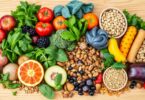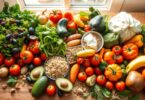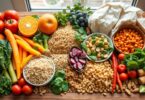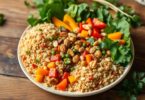Discover Nutritious Plant Based Sources for Your Diet
In today’s world, many of us are looking for healthier, more sustainable ways to live. We want to feed our bodies well and help the planet at the same time. This is why we’re turning to plant-based sources for our meals. But, what makes these options so good for us?
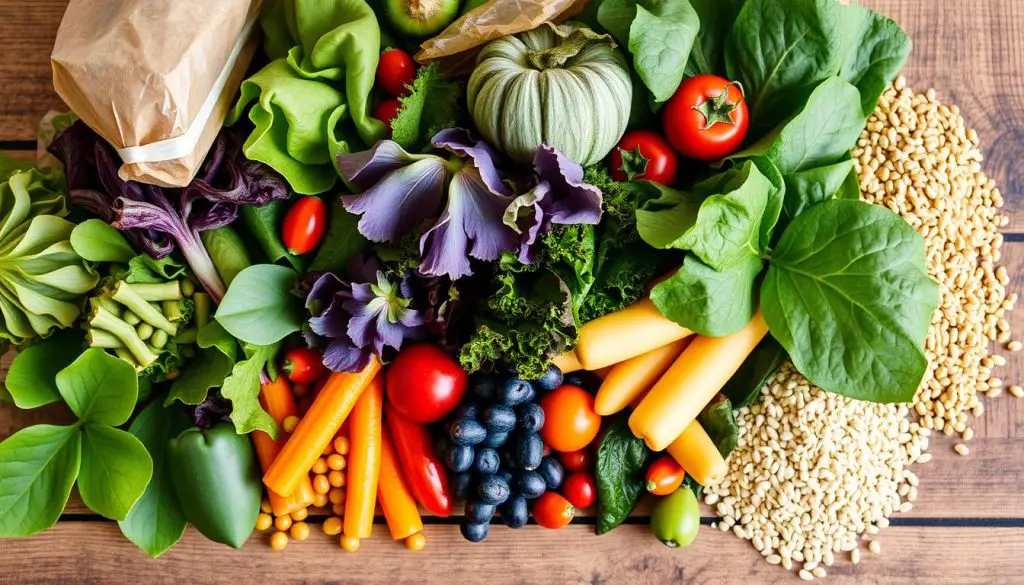
Key Takeaways
- Explore the diverse range of nutritious plant-based ingredients that can enhance your diet
- Discover the benefits of incorporating more plant-based sources, including sustainable proteins, essential nutrients, and delicious alternatives
- Learn how to make informed decisions about your dietary choices and support a healthier, more eco-friendly lifestyle
- Understand the versatility of plant-based options, from protein-rich legumes to nutrient-dense superfoods
- Gain insights into the various plant-based meat alternatives, dairy substitutes, and whole grains that can be seamlessly integrated into your meals
Embracing a Plant-Based Lifestyle
Choosing a plant-based diet is a big step towards better health and the planet. It means eating mostly whole, unprocessed plant foods. This reduces or removes animal products from your diet.
What is a Plant-Based Diet?
A plant-based diet focuses on plant-based foods like fruits, veggies, whole grains, and nuts. It’s all about eating a variety of plant-based meals. It also means less meat, dairy, and eggs.
Benefits of a Plant-Based Diet
Going plant-based can greatly improve your health. Here are some benefits:
- It’s good for your heart and lowers heart disease risk.
- It helps with weight management and body shape.
- It lowers the risk of diseases like type 2 diabetes and some cancers.
- It boosts gut health and strengthens your immune system.
- It gives you more energy and overall well-being.
By choosing plant-based nutrition, you get lots of vitamins, minerals, and fiber. These are key for staying healthy and full of energy.
“A plant-based diet is not just a fad; it’s a sustainable and nourishing way of life that can transform your health and your impact on the planet.”
Starting or deepening your plant-based journey is rewarding. You’ll find a world of tasty, healthy plant-based meals. These meals support your health and well-being.
Protein-Packed Plant Sources
Following a plant-based diet means you need to get enough high-quality protein. Legumes are a top choice because they’re packed with nutrients. They can be added to many tasty meals.
Legumes: A Powerhouse of Protein
Legumes include beans, lentils, peas, and peanuts. They’re great for a plant-based diet. A single cup of cooked lentils has 18 grams of protein.
- Beans: Black beans, kidney beans, chickpeas, and more offer between 12-15 grams of protein per cup, cooked.
- Lentils: From red to green to brown, lentils pack a powerful punch of plant-based protein, with 15-18 grams per cooked cup.
- Peas: Fresh or dried, peas provide around 8 grams of protein per cup.
- Peanuts: These beloved legumes boast 7 grams of protein per ounce, making them a great portable snack option.
Adding legumes to your diet is simple. Use them in salads, soups, and stews. You can also blend them into dips or enjoy them as a main dish. Legumes are a key part of a healthy, plant-based diet.
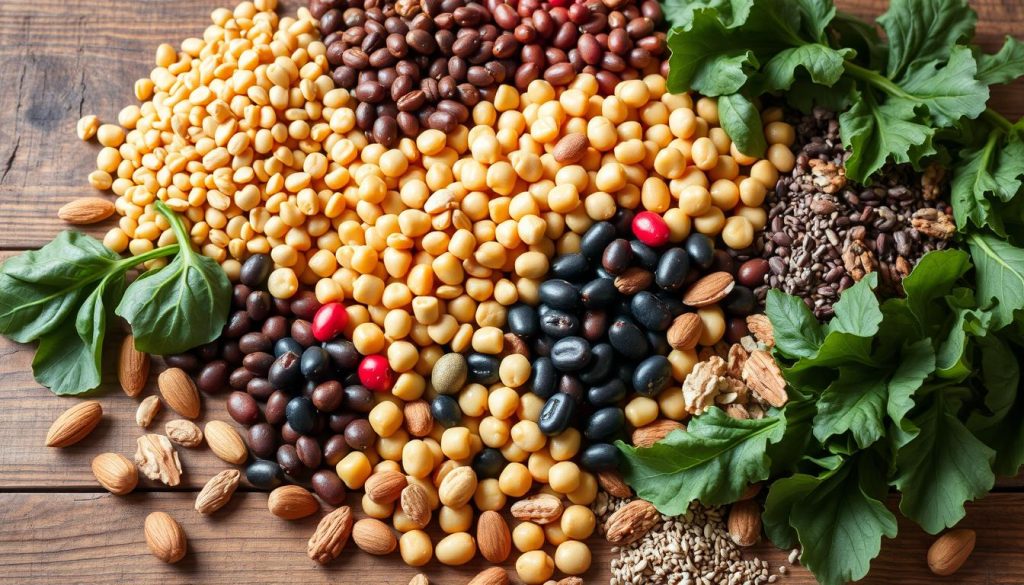
“Legumes are a versatile and inexpensive way to add more plant-based protein to your diet.”
Nutrient-Dense Plant Based Source
Plant-based foods are more than just protein. They are full of vitamins, minerals, fiber, and other good stuff. These foods can make your body strong and healthy. By eating a whole food plant-based diet, you can get the most out of your food.
Leafy greens are a great choice. Kale, spinach, and collard greens are full of vitamins A, C, and K. They also have calcium and iron. You can add them to salads, smoothies, and more to make your meals better.
| Nutrient-Dense Plant-Based Food | Key Nutrients |
|---|---|
| Avocado | Healthy fats, fiber, vitamins C, E, and K |
| Sweet Potatoes | Vitamin A, vitamin C, manganese, fiber |
| Broccoli | Vitamin C, vitamin K, folate, fiber |
| Berries | Antioxidants, vitamin C, fiber |
Other foods like avocados, sweet potatoes, broccoli, and berries are also packed with nutrients. They help keep your heart healthy, boost your immune system, and make you feel good overall. Eating a variety of these foods can make your plant-based nutrition even better.
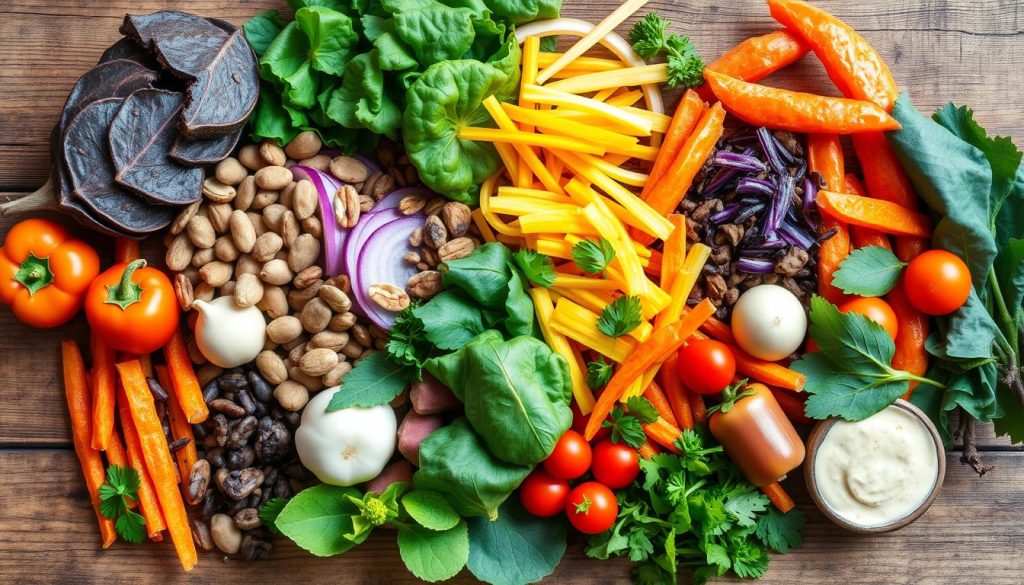
“A plant-based diet rich in nutrient-dense whole foods can provide all the essential nutrients your body needs to thrive.”
By choosing these nutrient-rich foods, you can make a healthy and balanced plant-based diet. This diet will help keep you strong and feeling great.
Exploring Whole Grains and Seeds
Whole grains and seeds are key in a plant-based diet. They offer essential nutrients like complex carbs, fiber, and vitamins. These ingredients boost your health and well-being.
Ancient Grains and Their Nutritional Value
Ancient grains are packed with nutrients. Quinoa, for example, is gluten-free and has all nine essential amino acids. It’s a complete protein.
Amaranth is rich in iron, magnesium, and calcium. It’s great for a whole food plant based diet. Bulgur, made from cracked wheat, is full of fiber and B vitamins. It gives you energy all day.
These grains are easy to add to many dishes. Try them in grain bowls or pilafs. They bring new flavors and textures to your plant based foods.
| Ancient Grain | Nutritional Highlights |
|---|---|
| Quinoa | Complete protein, gluten-free, high in fiber and minerals |
| Amaranth | Rich in iron, magnesium, and calcium, high in protein |
| Bulgur | High in fiber, B vitamins, and complex carbohydrates |
Using ancient grains and seeds makes your plant based foods more nutritious. They help you eat a balanced diet that’s good for your health.
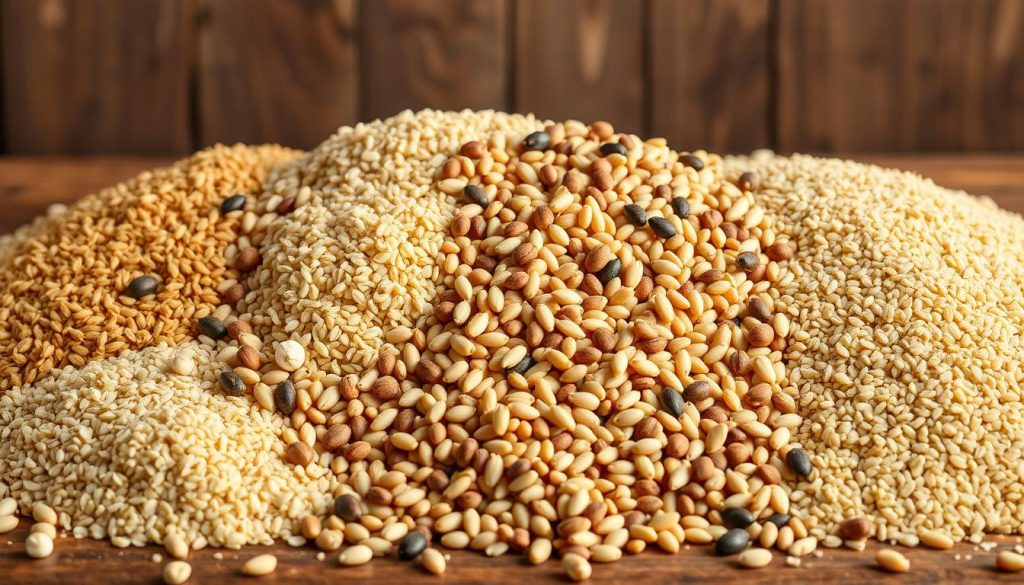
Incorporating Plant-Based Meat Alternatives
For those looking to eat less animal-based products, meat substitutes are a tasty and easy choice. These plant-based options are getting more popular. They meet the need for cruelty-free and eco-friendly nutrition.
Discovering meatless products opens up a world of new tastes. You can find everything from soy-based burgers to mushroom-based crumbles. These dairy-free options fit right into your favorite dishes. This way, you can enjoy meat-like flavors without harming your ethical eating goals.
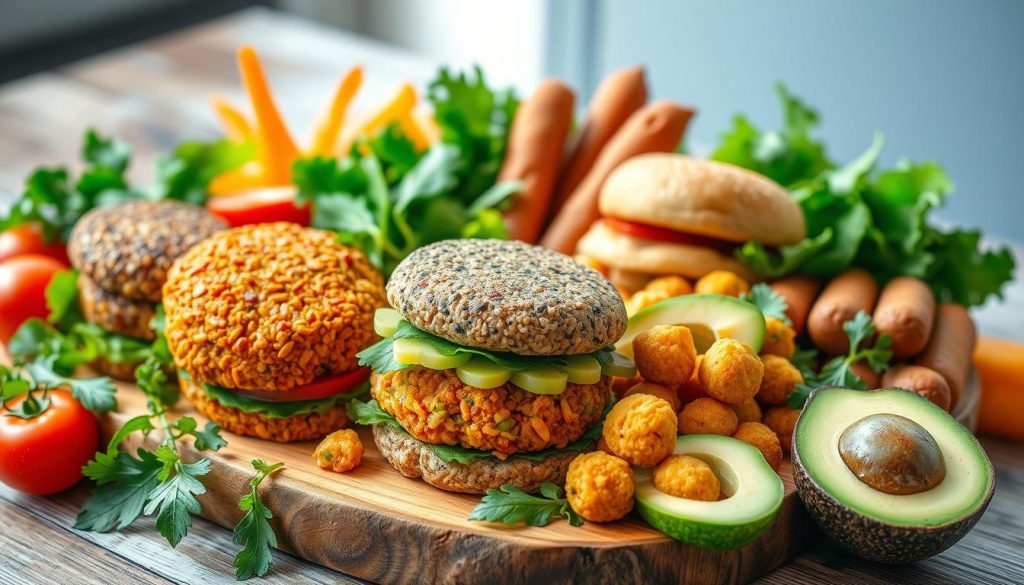
The meat substitute market has grown a lot. Now, you can find plant-based chicken, ground beef, and even deli slices. These meatless products are great for making many dishes. You can make everything from stews and tacos to sandwiches and stir-fries.
Adding plant-based meat alternatives to your diet is good for you and the planet. They are full of protein, fiber, and important vitamins and minerals. This makes them a healthy choice for your eco-friendly nutrition plan.
Whether you’re a vegan or just want to try cruelty-free foods, plant-based meat alternatives are a great choice. They make your meals delicious and support a sustainable and nourishing lifestyle.
Versatile Vegetables: A Feast of Flavors
Plant-based diets focus on vegetables, which are full of nutrients and taste great. These foods are key to a plant based foods lifestyle. They give us important vitamins, minerals, and fiber to keep our bodies healthy.
Leafy Greens: Nature’s Nutritional Gems
Leafy greens like spinach, kale, and Swiss chard are top choices in plant-based eating. They are loaded with antioxidants, fiber, and many nutrients. Adding healthy plant based recipes with these greens to your meals can boost your health.
- Spinach: Rich in vitamins A, C, and K, as well as folate and magnesium.
- Kale: A vegetarian alternatives superstar, high in vitamins A, C, and K, as well as calcium and iron.
- Swiss Chard: Boasts an impressive array of antioxidants, including vitamins A, C, and K, as well as minerals like potassium and magnesium.
Leafy greens are easy to use in many dishes. You can add them to salads, smoothies, stir-fries, and more. This makes it simple to include them in your meals every day.
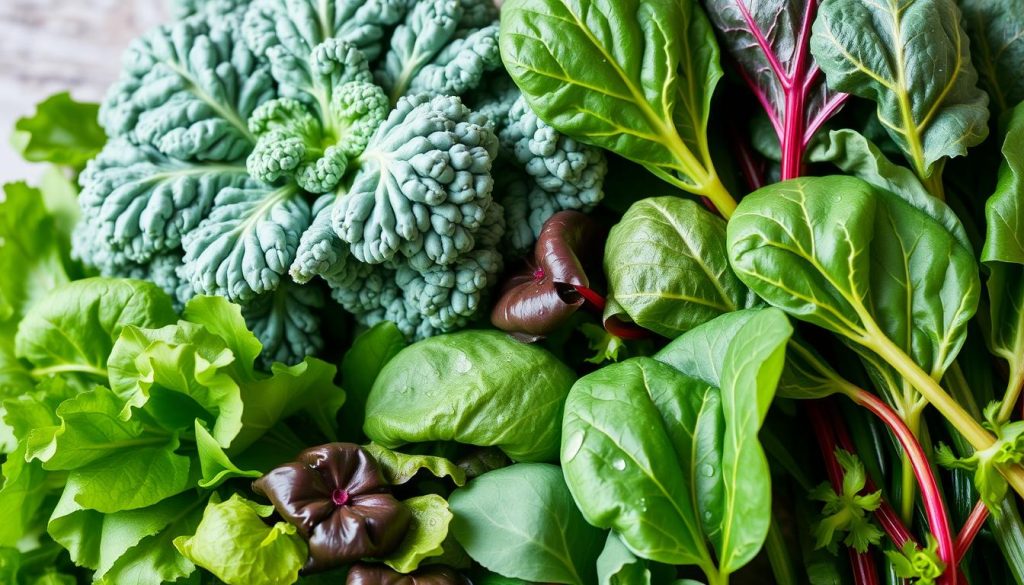
“Leafy greens are the ultimate allies in the pursuit of optimal health and wellness.”
Fruits: A Burst of Natural Sweetness
Fruits are key in a plant-based diet, adding sweetness, fiber, and health benefits. They come in many colors and flavors, making any meal or snack better. This adds taste and nutrition to your diet.
Fruits are not just tasty; they’re also good for you. They’re full of antioxidants, vitamins, and minerals. Eating a variety of fruits helps keep you healthy and balanced in a plant based foods lifestyle.
Exploring the Versatility of Fruits
Fruits can be used in many ways, from smoothies and salads to desserts and main dishes. Their sweetness balances out the flavors of other foods. This creates a delicious mix of tastes.
- Berries, such as blueberries, raspberries, and blackberries, are packed with antioxidants and make a wonderful addition to yogurt, oatmeal, and baked goods.
- Citrus fruits, like oranges, lemons, and limes, can add a refreshing zing to marinades, dressings, and even cocktails.
- Tropical fruits, such as mangoes, pineapples, and papayas, can transport your taste buds to exotic locales and lend a vibrant touch to salads, smoothies, and desserts.
Adding a variety of plant based foods, including fruits, makes meals more flavorful. It also ensures you get all the nutrients you need for good health.
| Fruit | Nutritional Benefits | Culinary Uses |
|---|---|---|
| Blueberries | Rich in antioxidants, vitamin C, and fiber | Smoothies, salads, baked goods |
| Oranges | High in vitamin C, folate, and potassium | Juices, marinades, dressings |
| Mangoes | Contain vitamins A, C, and E, as well as fiber | Smoothies, salads, salsas |
Using fruits’ natural sweetness and flavors can make your plant based foods and healthy plant based recipes more enjoyable. It ensures a healthy and tasty plant-based lifestyle.
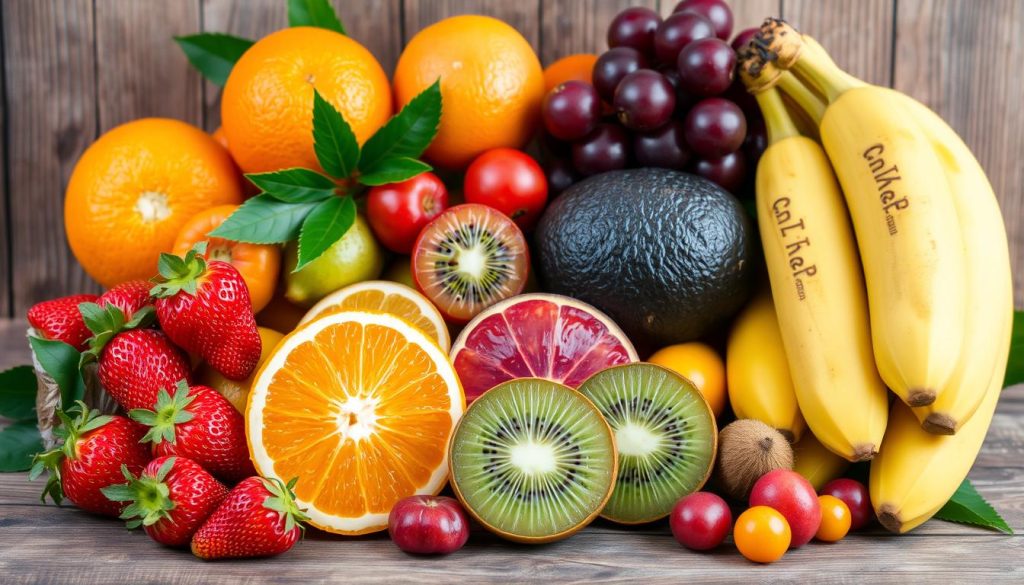
“Eat a rainbow of fruits and vegetables every day for optimal health and vitality.”
Plant-Based Dairy Alternatives
Many people are looking for a more ethical and eco-friendly diet. They’re exploring plant-based dairy alternatives. These products offer a wide range of options for those who want to cut down or eliminate dairy. From creamy non-dairy milks to rich cheese alternatives, the dairy-free world is exciting.
Exploring Non-Dairy Milk and Cheese Options
The dairy-free movement has brought many plant-based milk alternatives to the table. Soy milk, almond milk, oat milk, and coconut milk are just a few examples. They cater to different tastes and needs.
The world of plant-based cheese has also changed a lot. Now, you can find delicious dairy-free cheeses made from cashews, almonds, or coconut. They offer creamy textures and bold flavors, just like dairy cheeses.
These cruelty-free foods and eco-friendly nutrition options are great for those who follow a dairy-free diet. They also attract people who want to eat more ethically.
“The plant-based dairy revolution has opened up a world of meatless products and dairy-free options that are not only delicious but also align with my values of sustainable and ethical eating.”
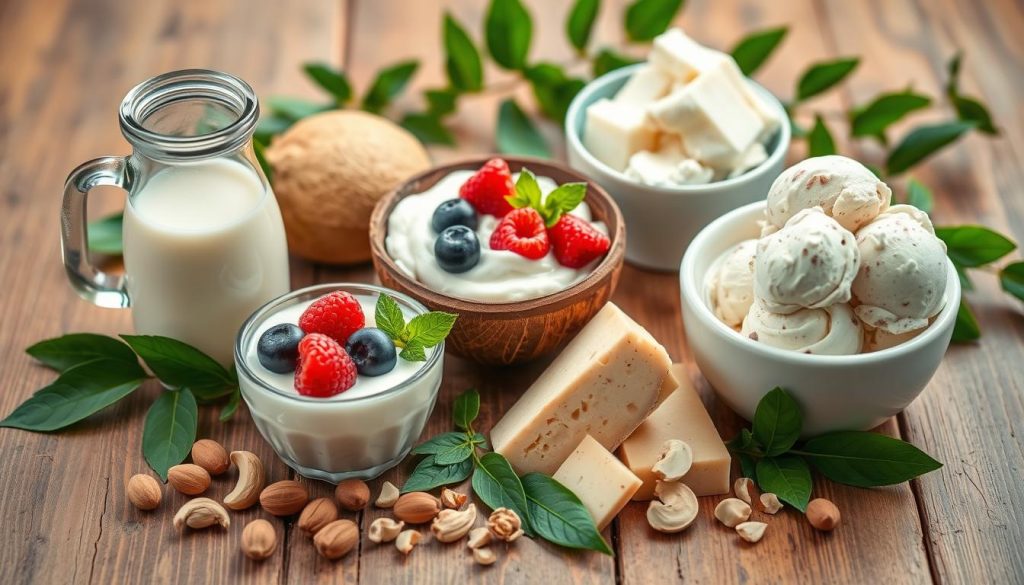
The demand for plant-based dairy alternatives keeps growing. The market is responding with more innovative and nutritious products. Whether you want to reduce your carbon footprint, live a cruelty-free lifestyle, or try new foods, plant-based dairy has lots to offer.
Nuts and Seeds: Crunchy Nutrient Boosters
Nuts and seeds are true nutritional powerhouses in the plant-based world. These tiny, crunchy morsels are packed with essential vitamins, minerals, and healthy fats. They can take your plant-based nutrition to new heights.
Nuts like almonds, walnuts, and cashews are high in protein, making them great for a plant-based diet. They also have lots of fiber, which helps with digestion and keeps you full. Plus, their healthy fats support heart health and brain function.
Seeds are just as impressive. Sustainable protein-rich options like chia, flax, and hemp seeds are full of essential nutrients. Chia seeds, for example, are rich in omega-3 fatty acids. Flax seeds offer plant-based lignans, which are antioxidants.
| Nuts | Nutritional Benefits |
|---|---|
| Almonds | High in vitamin E, magnesium, and healthy fats |
| Walnuts | Rich in omega-3 fatty acids, antioxidants, and fiber |
| Cashews | Good source of protein, copper, and magnesium |
Adding these plant-based foods to your daily routine boosts your nutrition. It supports a healthier, more sustainable lifestyle.
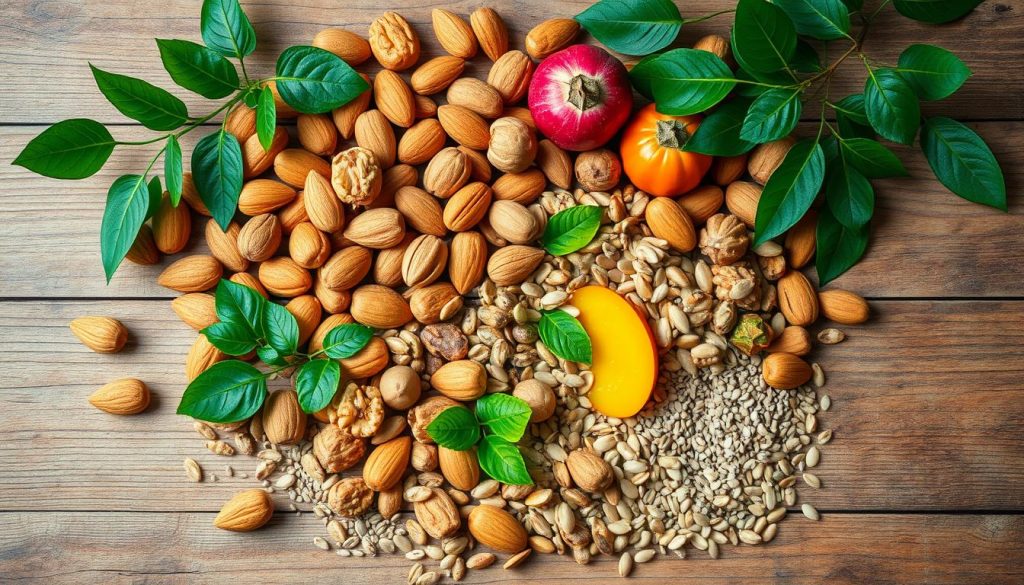
“Nuts and seeds are the unsung heroes of the plant-based world, providing a delicious and nutrient-dense boost to any diet.”
Plant-Based Superfoods
In the world of plant-based nutrition, some foods are true “superfoods.” They are packed with nutrients and offer many health benefits. These foods, from plants, are rich in vitamins, minerals, and antioxidants. They help keep us healthy and well.
Unleashing the Power of Superfoods
Plant-based superfoods include berries, herbs, and greens. They are great for adding nutrition to veggie-centric meals. Let’s look at some key superfoods and how they can boost your plant based nutrition.
- Nutrient-Dense Berries: Blueberries, raspberries, and acai berries are full of antioxidants and vitamins. They are great for your plant based nutrition.
- Antioxidant-Rich Herbs and Spices: Turmeric, ginger, and cinnamon are known for their anti-inflammatory effects. They can be added to veggie-centric meals or used as herbal supplements.
- Omega-Rich Seeds: Chia seeds, flaxseeds, and hemp seeds are good for your heart. They are rich in omega-3 fatty acids, making them great for plant based nutrition.
- Nutrient-Packed Leafy Greens: Kale, spinach, and collard greens are full of vitamins and minerals. They make your veggie-centric meals even healthier.
- Adaptogenic Mushrooms: Reishi, ashwagandha, and cordyceps are botanical extracts. They help your body handle stress and support your health.
Adding these plant-based superfoods to your diet can bring many benefits. They support a healthy and sustainable lifestyle.
| Superfood | Key Nutrients | Potential Health Benefits |
|---|---|---|
| Blueberries | Antioxidants, Vitamin C, Fiber | Improved brain function, Reduced inflammation, Enhanced immunity |
| Turmeric | Curcumin, Anti-inflammatory compounds | Reduced joint pain, Improved gut health, Potential cancer-fighting properties |
| Chia Seeds | Omega-3s, Fiber, Protein | Heart health, Digestive support, Balanced blood sugar levels |
| Kale | Vitamins A, C, and K, Calcium, Folate | Improved bone health, Enhanced eye health, Detoxification support |
| Reishi Mushroom | Antioxidants, Immune-boosting compounds | Reduced stress and anxiety, Improved sleep quality, Potential anti-cancer effects |
By adding these plant-based superfoods to your diet, you can get many nutritional benefits. They support your health and help you live a better, more sustainable life.
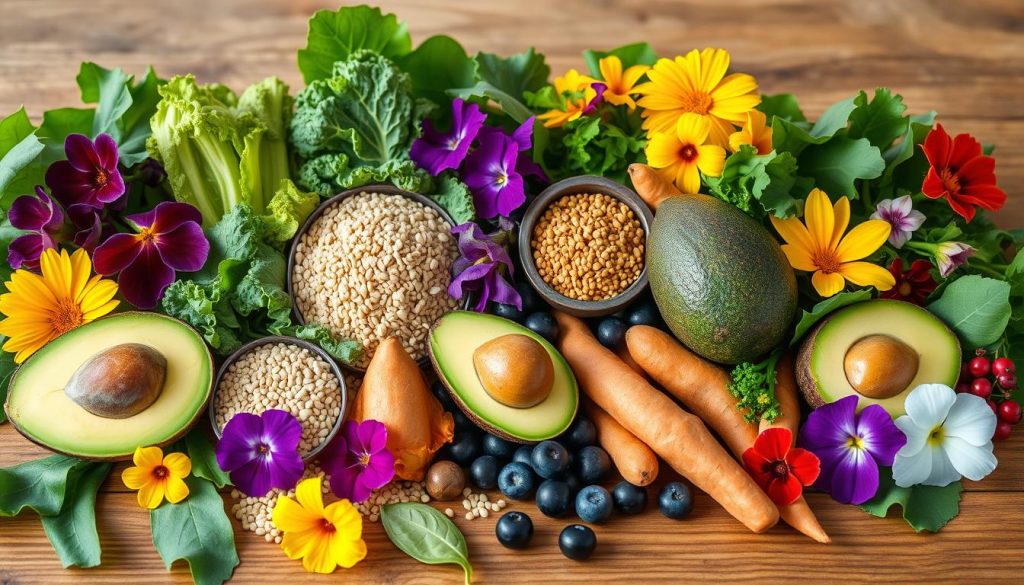
Plant Based Source for Optimal Health
Choosing a plant-based diet can change your life for the better. It’s a step towards better health and happiness. By focusing on plant-based nutrition, you open up a world of benefits.
A plant-based diet is great for your heart. It’s full of plant-based proteins, whole grains, and fiber. These can lower cholesterol, reduce blood pressure, and lower heart disease risk.
Also, a plant-based diet helps with weight control. Plant-based foods are often low in calories and high in fiber. This makes you feel full and helps you stay at a healthy weight.
Going plant-based also boosts your overall well-being. Plant-based foods are packed with antioxidants, phytochemicals, and nutrients. They support a strong immune system, improve brain function, and lower disease risks like type 2 diabetes and some cancers.
In short, eating a variety of plant-based foods leads to better health and a greener future.
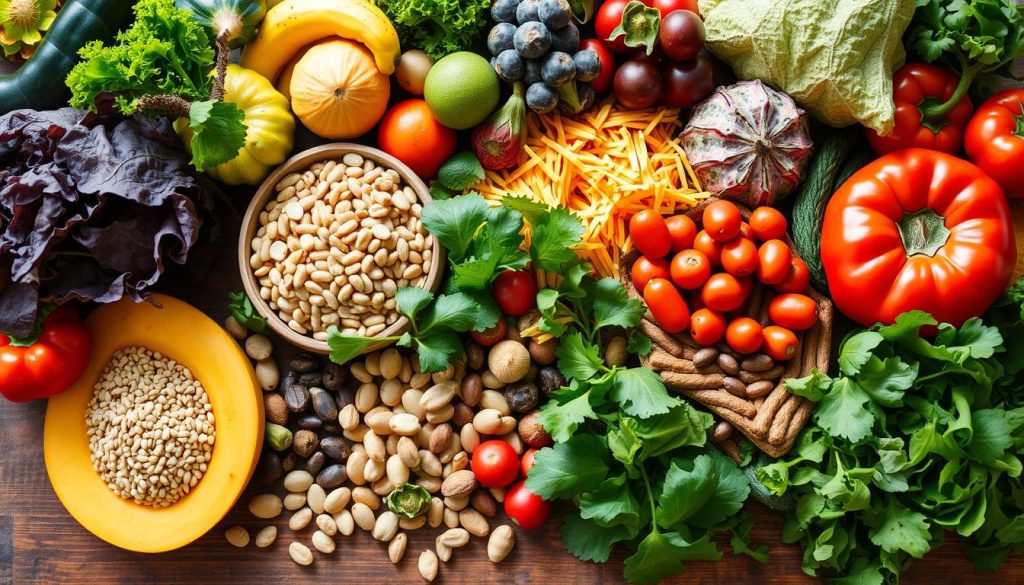
| Benefits of a Plant-Based Diet | Description |
|---|---|
| Cardiovascular Health | Helps lower cholesterol, reduce blood pressure, and minimize the risk of heart disease. |
| Weight Management | Promotes feelings of fullness and satiety, making it easier to maintain a healthy weight. |
| Immune System Support | The abundance of antioxidants and phytochemicals can help support a robust immune system. |
| Chronic Disease Prevention | Can reduce the risk of type 2 diabetes, certain types of cancer, and other chronic conditions. |
“Embracing a plant-based lifestyle is not just a dietary choice, but a journey towards a healthier, more sustainable future.”
By adding a variety of plant-based foods to your diet, you can achieve optimal health and a greener lifestyle.
Meal Planning and Preparation Tips
Starting a plant-based diet is exciting and rewarding. But, it can also have some practical challenges. With a few simple strategies, you can make delicious, healthy plant-based recipes. This will make your new lifestyle both sustainable and enjoyable.
Plan Ahead for Success
Planning ahead is key for easy plant-based meal preparation. Set aside time each week to plan your meals. This ensures you have all the ingredients you need and avoids last-minute stress.
- Create a weekly meal plan with a variety of plant-based foods. Include legumes, vegetables, and whole grains.
- Make a detailed grocery list to make shopping easier and reduce waste.
- Batch cook grains, roasted vegetables, and bean dishes. This makes quick meals easy.
Embrace Versatile Recipes
Look for plant-based recipes that are versatile. Meals that can be repurposed or adapted to different flavors are great. They expand your cooking skills and make meal planning easy.
| Versatile Plant-Based Recipes | Potential Variations |
|---|---|
| Lentil and Vegetable Stew | Serve over quinoa, stuff into bell peppers, or enjoy as a soup |
| Roasted Sweet Potato and Kale Salad | Add avocado, swap in different greens, or toss with a grain like farro |
| Tofu Stir-Fry with Brown Rice | Use the stir-fry mix as a filling for lettuce wraps or stuffed mushrooms |
By choosing versatile plant-based recipes, you save time and reduce waste. Your meals will stay exciting and varied.
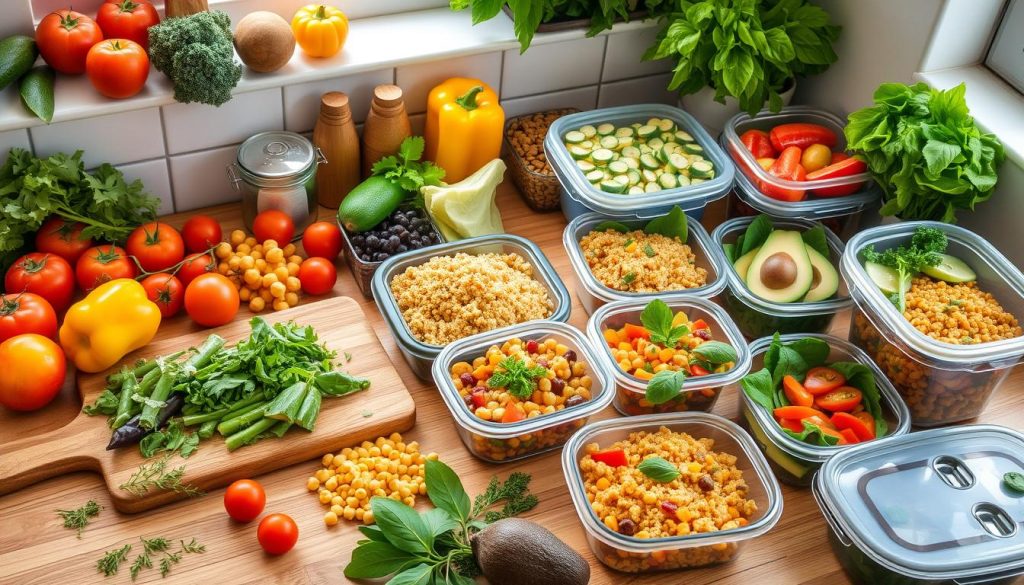
“The key to success on a plant-based diet is preparation. With a little planning, you’ll be well on your way to a healthier, more sustainable lifestyle.”
Overcoming Challenges on a Plant-Based Journey
Starting a plant-based diet can change your life, but it comes with challenges. Knowing how to handle these issues is crucial for a successful plant-based lifestyle.
Addressing Common Concerns and Misconceptions
Many plant-based diet beginners worry about getting enough nutrients, especially protein. But, a smart plant-based diet can give you plenty of protein from legumes, grains, and nuts. Also, don’t believe the myth that plant-based meals are boring or unsatisfying. With some creativity, you can make plant-based food delicious and varied.
Another worry is eating out or being with people who don’t get the plant-based lifestyle. But, talking openly and teaching your loved ones can make it easier. This way, plant-based diet beginners can keep their relationships strong while following their diet.
Some people also find it hard to find plant-based meal options that are both healthy and easy to make. But, with some planning and trying new things, plant-based diet for beginners can find lots of tasty and fulfilling meals.
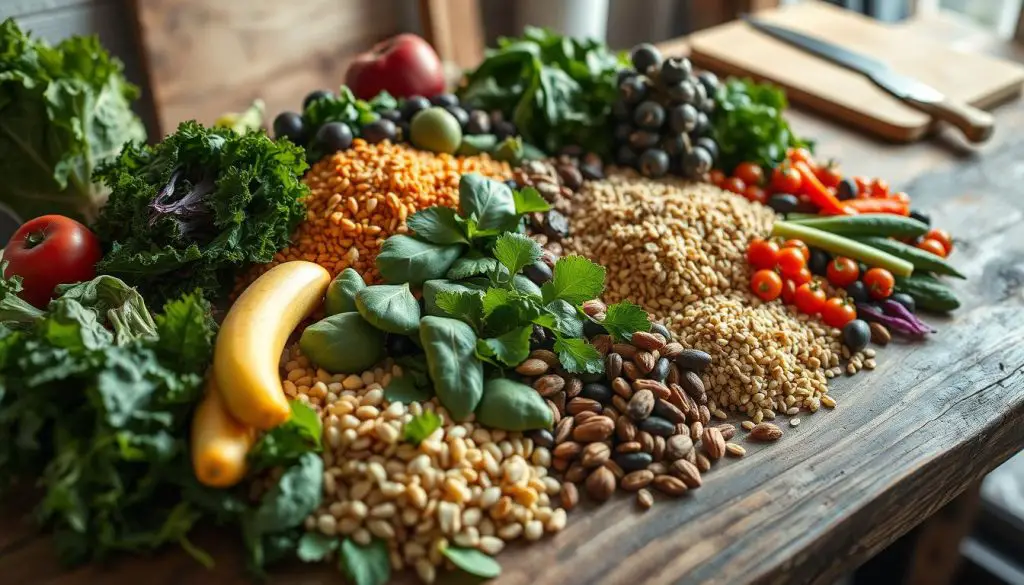
By facing these challenges, plant-based diet beginners can get past the tough start and enjoy the benefits of a plant-based diet. With the right attitude, tools, and support, the journey to a healthier, greener life can be both empowering and fulfilling.
Conclusion: Embracing a Sustainable and Nourishing Lifestyle
Exploring plant-based nutrition shows us a path to a better lifestyle. By eating a variety of plant based foods, you help your body and the planet. Foods like legumes and superfoods are key to this.
This article has given you the tools to start eating more veggie-centric meals. You can improve your health, help the environment, and find cruelty-free products and sustainable protein. These choices will guide you on a rewarding plant based journey.
Choosing a sustainable and nourishing lifestyle brings many benefits. You’ll feel better and connect more with your food. This choice also helps our planet and promotes kindness towards all living beings.
FAQ
What is a plant-based diet?
A plant-based diet focuses on whole, unprocessed foods like fruits, veggies, and whole grains. It also includes legumes, nuts, and seeds. This diet cuts down on animal products like meat, dairy, and eggs.
What are the benefits of a plant-based diet?
Eating plant-based can improve heart health and help with weight management. It also lowers the risk of chronic diseases. Plus, it boosts your intake of vitamins, minerals, and fiber. It’s good for the planet too, supporting sustainable farming and reducing carbon emissions.
Where can I find high-protein plant sources?
Legumes like beans, lentils, and chickpeas are great for protein. Quinoa, tofu, tempeh, nuts, and seeds are also high in protein.
What are some nutrient-dense plant-based foods?
Leafy greens, berries, sweet potatoes, avocados, chia seeds, and spirulina are packed with nutrients. They offer vitamins, minerals, and antioxidants.
How can I incorporate more whole grains and seeds into my plant-based diet?
Try adding quinoa, amaranth, and bulgur to your meals. Chia, flax, and hemp seeds are great too. Use them in salads, bowls, and baked goods for extra fiber and nutrients.
What are some plant-based meat alternatives?
Tofu, tempeh, seitan, and plant-based burgers are popular meat substitutes. They’re made from soy, pea protein, or mushrooms. These options are kind to animals and taste great.
How can I make the transition to a plant-based diet?
Start by adding more plant-based foods to your meals. Try new recipes and ingredients. Address any doubts you have to make the switch smoothly.
What are some common concerns about a plant-based diet?
Some worry about getting enough protein, iron, and vitamin B12 on a plant-based diet. Learning about these nutrients and planning your meals can help. Sometimes, supplements are needed to meet nutritional needs.


